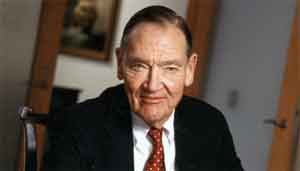
John Bogle and Jeremy Siegel Debate Index Funds
John Bogle founded Vanguard and the index fund movement. Put simply, cost-conscious modern financial advice is to buy index funds, which track the performance of a large selection of stocks usually grouped by market cap, and hold on to them for a long time as they appreciate over time. This theory is based in part on Bogle’s own research.
Jeremy Siegel sees some weakness in not the fundamental theory, but in the way in which indexes are implemented. This article in USA Today interviews Bogle and Siegel, and illustrates their opposing viewpoints. Siegel:
I remember when Yahoo went in (to the S&P 500) in December 1999 that it was already overpriced. I was holding a lot of Vanguard Index 500 fund and I said, “Oh my God, what am I buying? Is there any way out of this?” That’s when I started to think about alternative indices that might not overweight these stocks that we know that people in speculative bubbles will overweight.
By the time stocks are entered into the S&P 500 Index, they’ve already proven their worthiness or have gained too much popularity. Those investing in an index fund tracking the index, like VFINX, are introduced to the newly-included stock after its price run-up.

Bogle responds:
Irrelevant, I’d say, what we’ve earned in that short period of time. What is relevant is what the fund actually has delivered. I’m not talking hypotheticals here. I ran into a real live investor in the fund, a charter investor, bought 1,000 shares for $15,000 when the underwriting took place in August 1976… That $15,000 is now worth $461,771. That’s a return of a little over 12%…
Siegel’s solution (to the problem Bogle doesn’t think exists) is to weight stocks in the fund based on dividends offered or earnings. Companies giving back to the shareholders and performing well represent a larger percentage of an investment in the fund than companies slower to perform or reinvesting their earnings.
Jeremy Siegel’s company, WisdomTree, offers index exchange-traded funds not quite as popular as the index mutual funds offered by Vanguard, based on this philosophy. One of the more popular Siegel ETF is the WisdomTree Total Dividend Fund (DTD). Year to date, DTD is outperforming VFINX.


Article comments
Interesting, thanks for pointing this out Flexo. I’ve been a VFINX man for years but it’s always nice to hear alternative views, I’ll have to do more research on Siegel’s approach.
Its called fundamental indexing.
http://www.frontlinethoughts.com/article.asp?id=mwo061606
I’m a fan of both Bogle and Siegel, but I think I’m siding with both and leaning more towards Bogle. The reason being the close to Samerwriter’s reason, you can make any index you want and pick a stock to add to it. I am sure Dr. Siegel has sound financial reasoning to choose what he chooses, but an index can be pulled out of a hat. In fact, I could make a fund out of those picks and call it the MAPGIRL HAT100 INDEX FUND(TM), market it, and do reasonably ok compared to professional CFA’s.
So nobody steal my idea, ok?
The number of Microsofts is far outnumbered by the number of pets.com. What do the historic numbers show? “Compelling” growth stocks have underperformed value by a good 4% since 1920.
My strategy — 66% Bogle, 33% Siegel. Capture the overall market but then overweight in the segment that has historically (and perhaps fundamentally) outpeformed.
The problem with the proposed alternative indexing strategies is that they are even more arbitrary than market cap.
Market cap is an evaluation by the market of numerous factors. Including those proposed as the alternative index.
Siegel uses the overpriced Yahoo as an example of why capitalization-based indexing is a bad idea.
Dividend-based allocation would have missed out on the phenomenal growth of many tech companies (for example Microsoft) who, for most of their history paid no dividend (or a negligible dividend).
EPS will miss out on companies that the market determines have a compelling growth story.
Effectively what Siegel is doing is stock-picking. He doesn’t want YHOO in his index, so he invents an index that underweights YHOO. The market cap is the value that the market puts on the stock, and Siegel is trying to outsmart the market.
I think I’ll stick with Bogle.